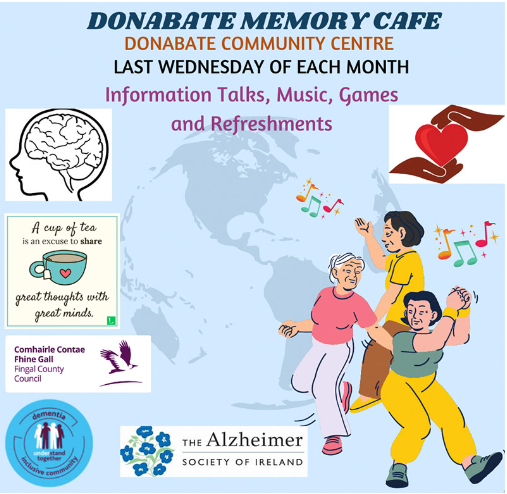Programme: Fingal
WHO Theme: Community Support and Health Services
Cost: 500 – 1000
Status: Completed
Description
Memory cafe works under four pillars Atmosphere, Information, Support, Community. We provide 15 mins light exercise to warm -up, 2 informational speakers 15/20 session each while providing entertainment and light refreshments for them to social gathering place for individuals with memory issues, such as dementia or Alzheimer’s disease, as well as their caregivers and family members. The primary aim of the memory café is to provide a supportive, welcoming, and stigma-free environment where participants can engage in meaningful activities, share experiences, and access resources.
Aim of Initiative
On the last Wednesday of each month 11am-1pm memory café aims to enhance the quality of life for both individuals with memory challenges and their caregivers by providing a safe, enjoyable, and resourceful environment. Offer opportunities for social interaction, reducing the isolation. Offer access to information about dementia and other memory-related conditions, as well as resources for support and care. Foster a sense of belonging and community for individuals with memory issues and their families, promoting a more inclusive and understanding society. Engage participants in activities designed to stimulate cognitive function, creativity, and enjoyment, which can include music, arts and crafts, games, and reminiscence sessions.
Who is it aimed at
All families and carers living or caring for people living with Dementia or Alzheimer’s
3 Steps critical to success
- Sustainability Financing-To guarantee the memory café’s long-term viability, look for continuing financing sources such as grants, contributions, and sponsorships. Volunteer Retention: To guarantee volunteers’ ongoing assistance, create an environment that is both gratifying and pleasant for them. Carefully carrying out these measures will contribute to the establishment of a successful and long-lasting memory café that offers significant engagement and support to people with memory impairments and those who care for them.
- The Committee – from interested parties that includes community leaders, carers and medical professionals. To plan the sessions, budgets, safety, informational pieces, entertainers and Mental stimulation. Offering assistance, social connections and safe hospitable environment while serving light refreshments in a relaxed atmosphere.
- Marketing and Communication-Make use of a variety of platforms, including fliers, social media, local media, and community activities, to publicise the memory café. Partnerships: Work with neighbourhood associations, elder centres, and healthcare services in the community. Send out personal invitations to prospective participants and their families. Continuously evaluate the success of the programme, periodically get input from volunteers, carers, and participants.
3 Challenges in Planning / Delivery
- Financial Stability securing consistent funding can be challenging. Memory cafés often rely on grants, donations, and sponsorships, which can be unpredictable and fluctuate over time.
Resource Allocation: Ensuring there are sufficient resources for activities and refreshments. - Attracting Participants reaching out to and convincing potential participants and their caregivers to attend can be difficult, especially if there is a lack of awareness about the memory café. Encouraging regular attendance can be difficult, particularly if participants face transportation issues, health problems, or other barriers that prevent them from coming regularly.
- Training and Support for Volunteers who need proper training in dementia awareness and effective communication strategies, which requires time and resources. Ensuring that volunteers do not become overwhelmed or burnt out is crucial for retaining a reliable team.
3 Outcomes / Benefits
- Resources and Respite by providing carers with a break from their taxing caregiving duties, memory cafés help to prevent carer burnout. Resource Sharing exchanging knowledge, advice, and resources with one another, carers can obtain important insights and encouragement that will enable them to carry out their caregiving responsibilities more skilfully. Information frequently gives carers access to information about community services, support groups, and educational resources, assisting them in finding more aid and support.
- Engaging Sessions through structured activities such as music, arts and crafts, games, and storytelling, memory café provides cognitive stimulation that can help maintain mental functions and slow the progression of memory loss. Participating in enjoyable and meaningful activities can boost mood, reduce stress, and enhance overall mental health for both individuals with memory impairments and their caregivers. Engaging in activities and social interactions can provide participants with a sense of accomplishment and purpose.
- Improved Social Engagement
Decreased Isolation provide a warm and secure setting where people with memory loss and those who care for them can interact with others who have similar experiences. This lessens emotions of isolation and loneliness. Community Building through establishing friendships and support systems that go beyond the café gatherings, participants can develop a feeling of belonging and community.

